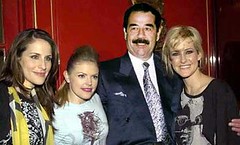Not Fired -- Firing Squad
Constitution of the United States, Art. III, Sec. 3.
Clause 1: Treason against the United States, shall consist only in levying War against them, or in adhering to their Enemies, giving them Aid and Comfort.
Transcript of Peter Arnett interview on Iraqi TV
Monday, March 31, 2003 Posted: 0306 GMT (11:06 AM HKT)
BAGHDAD, Iraq (CNN) -- The U.S. war plan has "failed," veteran war correspondent Peter Arnett told Iraqi TV in an interview that aired Sunday. Following is a transcript of that interview:
IRAQI TV HOST: Welcome in Baghdad, and our people know you, know your reports to CNN in 1991. Let us start with a question about the general image that you look now in Iraq.
ARNETT: Well, I'd like to say from the beginning that the 12 years I've been coming here, I've met unfailing courtesy and cooperation. Courtesy from your people, and cooperation from the Ministry of Information, which has allowed me and many other reporters to cover 12 whole years since the Gulf War with a degree of freedom which we appreciate. And that is continuing today.
HOST: (Translates into Arabic)
ARNETT: In answer to your question, it is clear that within the United States there is growing challenge to President Bush about the conduct of the war and also opposition to the war. So our reports about civilian casualties here, about the resistance of the Iraqi forces, are going back to the United States. It helps those who oppose the war when you challenge the policy to develop their arguments.
HOST: (in Arabic)
ARNETT: One other point. I've been mainly in Baghdad in the past few weeks. But, clearly this is a city that is disciplined, the population is responsive to the government's requirements of discipline and my Iraqi friends tell me there is a growing sense of nationalism and resistance to what the United States and Britain are doing.
HOST: (In Arabic first) What have you seen until now, have you been to some of these places where civilian casualties have been seen during these two days?
ARNETT: Yeah, I think American policy and strategy is the weakest when it comes to the Iraqi people. The U.S. administration is concerned with the possibility of killing civilians, because the international community is very concerned about the Iraqi people. President Bush says he is concerned about the Iraqi people, but if Iraqi people are dying in numbers, then American policy will be challenged very strongly.
HOST: (In Arabic)
ARNETT: For that reason, the Pentagon keeps saying that the civilian casualties, particularly in Baghdad in the last three or four days, at the market places -- the Pentagon says -- well they are Iraqi missiles that land amongst the people. They keep saying that, but of course the Iraqi government says they are clearly cruise missiles that hit the population.
HOST: (In Arabic)
ARNETT: For that reason the Pentagon keeps saying that maybe it is an Iraqi missile that hit the population and not a U.S. Whenever I gave a report on civilian casualties on CNN (in the first Gulf War) the Pentagon and the Bush administration got very angry and called me a traitor.
HOST: (In Arabic)
ARNETT: However, when missiles hit the Al-Maria shelter in early February of 1991, killing nearly 400 women and children, the Bush administration had to admit that they were responsible. And when that happened, there was a different attitude to the war. They had to try and complete the war fast, because the world criticized that bombing very severely.
HOST: (In Arabic)
ARNETT: Clearly, the American war planners misjudged the determination of the Iraqi forces.
HOST: (In Arabic)
ARNETT: And I personally do not understand how that happened, because I've been here many times and in my commentaries on television I would tell the Americans about the determination of the Iraqi forces, the determination of the government, and the willingness to fight for their country. But me, and others who felt the same way were not listened to by the Bush administration.
HOST: (In Arabic)
ARNETT: That is why now America is re-appraising the battlefield, delaying the war, maybe a week, and re-writing the war plan. The first war plan has failed because of Iraqi resistance now they are trying to write another war plan.
HOST: Yeah. (Speaks in Arabic) Mr. Arnett Thank you very much. (Speaks in Arabic)
Monk


